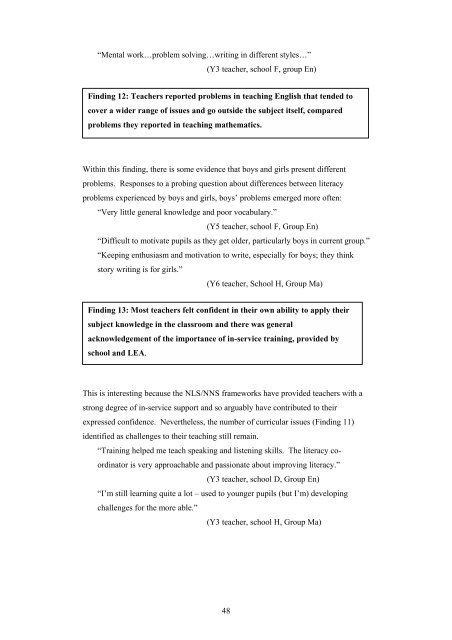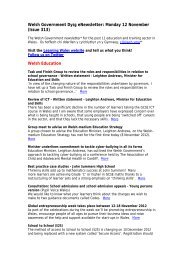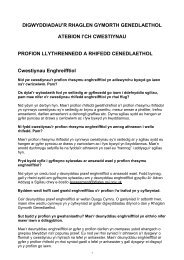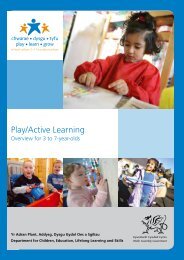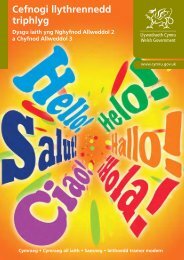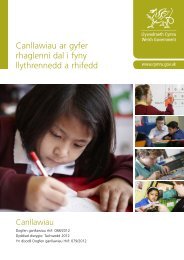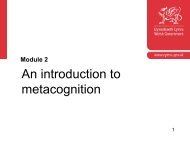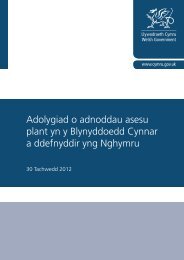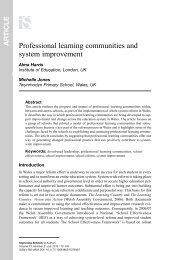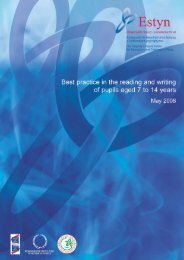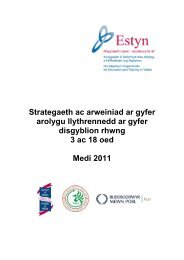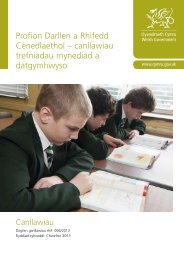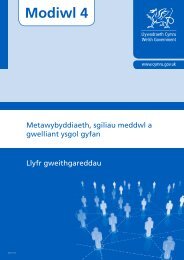- Page 1 and 2: RESEARCHTeaching Approaches to Prom
- Page 3 and 4: ContentsPageExecutive Summary 4Chap
- Page 5 and 6: Executive SummaryIntroductionThis r
- Page 7 and 8: • interviews were carried out wit
- Page 9 and 10: ImplicationsThere are three keys ar
- Page 11 and 12: could be enabled to reach their pot
- Page 13 and 14: Chapter 2 Literature review2.0 Intr
- Page 15 and 16: can all be seen as falling within t
- Page 17 and 18: 2.2.3 Ability groupingIn spite of m
- Page 19 and 20: found that students’ orientation
- Page 21 and 22: 2.2.8 Special programmes and withdr
- Page 23 and 24: Desforges’ (2003) conclusion is t
- Page 25 and 26: learning was greater than their own
- Page 27 and 28: 2.4.2 Gender and assessmentResearch
- Page 29 and 30: • School-level leadership issues
- Page 31 and 32: achievement, each of the case study
- Page 33 and 34: 3.2.2 Procedures for data collectio
- Page 35 and 36: There is a considerable level of ec
- Page 37 and 38: children. By having some focus grou
- Page 39 and 40: and varying across sex in each scho
- Page 41 and 42: There were, however, interesting di
- Page 43 and 44: “The NNS and NLS improved subject
- Page 45 and 46: “People feel safe with number wor
- Page 47: might exist to account for reaching
- Page 51 and 52: Chapter 5 The influence of school p
- Page 53 and 54: National statistics do not really s
- Page 55 and 56: Finding 17: With very few exception
- Page 57 and 58: consolidate what had been learnt. I
- Page 59 and 60: classes. In these schools there was
- Page 61 and 62: The points she was making were that
- Page 63 and 64: In the present research, different
- Page 65 and 66: support mechanisms are used. There
- Page 67 and 68: 5.3 SummaryHead teachers had a clea
- Page 69 and 70: She commented that“It’s difficu
- Page 71 and 72: 6.2.1 Cross-curricular linksThe str
- Page 73 and 74: parents at the start of each half o
- Page 75 and 76: 6.2.4 Links between learning tasks
- Page 77 and 78: 6.3.2 Integration of social and edu
- Page 79 and 80: 6.3.3 Differentiation and support f
- Page 81 and 82: haven’t tried..” to being told
- Page 83 and 84: “Both boys and girls aware that t
- Page 85 and 86: to be some assumptions in which non
- Page 87 and 88: Chapter 7 Conclusion and implicatio
- Page 89 and 90: number of schools dropped further t
- Page 91 and 92: leaders, they need to be able to an
- Page 93 and 94: Targets are a factor, in the tenden
- Page 95 and 96: • Considering the nature of inter
- Page 97 and 98: Brookhart, S. and de Voge, J. (1999
- Page 99 and 100:
Research evidence in education libr
- Page 101 and 102:
Youth with Emotional/ Behavioral Di
- Page 103 and 104:
Aims and research questionsThe main
- Page 105 and 106:
Appendix 2Long List of Schools from
- Page 107 and 108:
English Betterhigh FSM 1 Leeds 60 6
- Page 109 and 110:
Appendix 3Head teacher Interview pr
- Page 111 and 112:
Differences between year groupsGend
- Page 113 and 114:
How does it relate to NLS2. Teachin
- Page 115 and 116:
Use of LSA or equivalentSENCOUseful
- Page 117 and 118:
To be completed alone or collaborat
- Page 119 and 120:
Other.9. Policy on c.p.d.Open ended
- Page 121 and 122:
Strengths with possible Level 4 pup
- Page 123 and 124:
Other.5. Opportunities for learning
- Page 125 and 126:
2. How does the school promote cons
- Page 127 and 128:
126
- Page 129 and 130:
Same/different across Ys 3-6 in KS2
- Page 131 and 132:
Open-ended reply:Do all ability lev
- Page 133 and 134:
D Practice of role as subject co-or
- Page 135 and 136:
MixtureWhole classSmall groupPaired
- Page 137 and 138:
20 Have there been any changes in t
- Page 139 and 140:
Types of interventionTargeted teach
- Page 141 and 142:
Appendix 4Interview schedule: Teach
- Page 143 and 144:
Open ended reply:Prompts about spec
- Page 145 and 146:
4 How do you feel about your own En
- Page 147 and 148:
C School policy and practice: Relev
- Page 149 and 150:
10 How would you describe patterns
- Page 151 and 152:
12 What steps have you taken to ena
- Page 153 and 154:
14 Would you describe how you plan
- Page 155 and 156:
16 (To Y6 Teachers only) How would
- Page 157 and 158:
18 (Y6 only) How do you feel about
- Page 159 and 160:
20 Would you talk about how curricu
- Page 161 and 162:
22 How would you describe the seati
- Page 163 and 164:
22 To what type of feedback do you
- Page 165 and 166:
Appendix 5 Pupil focus groups.A. Ba
- Page 167 and 168:
C. Classroom teaching approaches: 1
- Page 169 and 170:
How are they different?How are they
- Page 171 and 172:
In mathematics?Encouragement / reas
- Page 173 and 174:
10. When was your last homework in
- Page 175 and 176:
3. Think of materials you use and t
- Page 177 and 178:
176
- Page 179 and 180:
ListPrompts.Intellectual demand?Pup
- Page 181 and 182:
General observation. . PromptsAmoun
- Page 183 and 184:
4. Classroom environment, including
- Page 185 and 186:
3. Tasks and activities in main par
- Page 187 and 188:
6. What social skills did pupils pr
- Page 189 and 190:
To boys - examples?To girls - examp
- Page 191 and 192:
5. Responses of boys and girls to t


